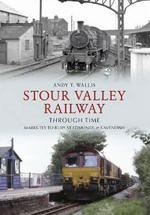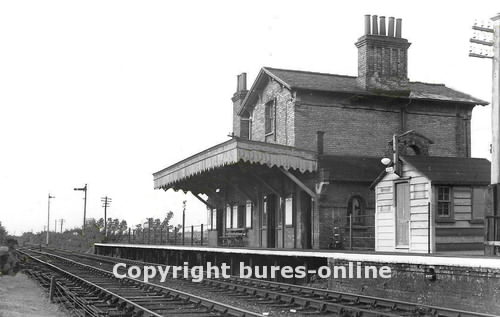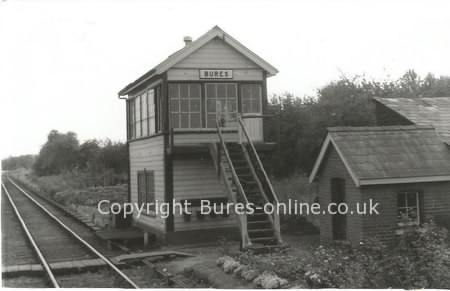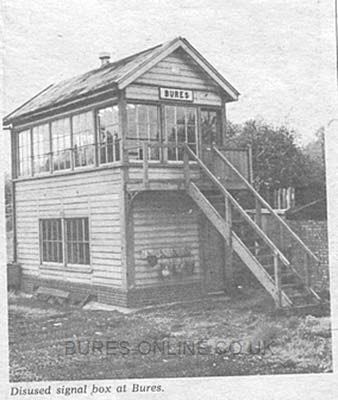|
The present day rail
link runs from Marks Tey through Chappel to Bures and finally terminates
at Sudbury.
However, today it only exists as a small branch line compared to its
original route which ran from Marks Tey all the way to Bury St Edmunds
or Haverhill/Cambridge.
The line was opened
throughout from Marks Tey to Sudbury for traffic on 2nd July 1849.
The original train service consisted of four trains in each direction
on weekdays only. Fares were governed by an Act of Parliament, namely
3d per mile first class, 2d per mile second and 1p per mile, third
class. Third class remained in force until 1956, when it was renamed
second class.
The journey time between Marks Tey and Sudbury, varied between 28
and 45 minutes which was the average for such a branch line.
(Today by modern Sprinter the average
journey time is 19 minutes)
It was not until 9th
August 1865, that the link to Bury and Haverhill was finally completed.
The Branch Line
that never was:- Railways were gradually spreading over the region
and it was proposed by a small railway company in 1863 called the
Mistley, Thorpe and Walton Railway to run a River Stour Extension
line from the main line junction at Manningtree along the south bank
of the river through Dedham and Nayland to Bures where it would have
joined the existing Stour Valley line which runs from Sudbury to Marks
Tey.
|
|
Station Buildings
Demolished 1973
|
|
|
|
|
|
Photograph dated 1973, in the
process of demolition
|
.
|
|
The signal box was
disused in 1962, as it was no longer required for the Sidings
traffic
It was finally demolished in September 1965, the track points
were removed and the single line section becoming Chappel/Sudbury |
|
List of Staff at the station
and dates
July 1949 - TUBB, A. E. Station
Master Bures to Station Master Tallington
September 1949 - FOX, R. W. G. Station Master Mellis to Station
Master Bures
January 1953 - FOX, R. W. G. Station Master Bures to Station
Master Harlow
February 1953 - ELLIS, R. D. Relief Station Master Doncaster
to Station Master Bures
July 1953 - WILDING, J. Ganger, Bures (retired) died aged
87, 10th February 1953
November 1958 - MARITT, R. G. Station Master, Newport retired
(served at Bures)
March 1959 - BOREHAM, A. G. Signalman, Bures retired 29th
May 1958
May 1960 - SMITH, A. J. Signalman, Bures (retired) died aged
82, 12th January 1960
September 1960 - ELLIS, R. D. Station Master, Bures to Station
Master, Somersham (replaced by GRAY, R. R.)
6th February 1966 - GRAY, R. R. Station Master, Bures to Clerk,
Sudbury
|
|
This reduction
in rail freight traffic is rather ironic as the arrival of the trains
had earlier caused the demise of barge traffic on the river, carrying
goods. Rail was now faster and more reliable.
The coming of road vehicles was now having the same effect and the
carriage of freight by rail, was ultimately doomed.
The last freight train travelled on the Stour Valley Line on 18th
June 1962.
However, a single freight train was retained and ran between Sudbury
to Bures and back when required, but this ceased on December 28th
1964.
TIMETABLE
OF CLOSURE
Long Melford
to Bury passenger service ceased 10th April 1961, Lavenham, Cockfield
and Welnetham continued to handle parcels and goods for a couple of
more years.
Passenger service on the Colne Valley line ceased 1st Jan 1962
Long Melford to Lavenham track lifted 1962
Sturmer closed to freight on 25th June 1962
Welnetham closed to freight on 13th July 1964
Bures, Cavendish, Bartlow, White and Earls Colne and Gt Yeldham closed
to freight on 28th Dec 1964
Sible and Castle Hedingham closed to freight on 13th July 1964
In April
1965, the then British Railways Board applied for permission to withdraw
passenger service from the whole of the line between Marks Tey and
Cambridge. After a bitter struggle, local opposition managed to get
the section between Sudbury and Marks Tey retained on account of its
potential growth in commuter traffic and the expansion of Sudbury.
However approval was granted for the section between Sudbury and Cambridge
to be closed,
Bury to
Lavenham freight withdrawn 19th April 1965
Gt Yeldam
to Haverhill ceased 19th April 1965
Halstead, White Colne, Earls Colne, Hedingham, Pamisford, Haverhill
South, Stoke, Lavenham and Cockfield all closed 19th April 1965
Clare, Linton, Glemsford and Long Melford closed on 12th Sept 1965
Haverhill North and all freight on the Stour & Colne Valley lines
withdrawn 31st October 1966
All passenger services to the north of Sudbury
to Cambridge ceased on 6th March 1967
Chappel signal box and all points removed 20th August 1967
Marks Tey - Chappel - Bures - Sudbury was now the only original 1849
section of the two branch lines remaining,
13/11/2022
Technical
data taken from Branches & Byways of East Anglia by John Brodribb
updat with newspaper cutting 22/02/2017
updated with 1900 Station photo 29/08/21
|







